Violence against women: The families demanding change
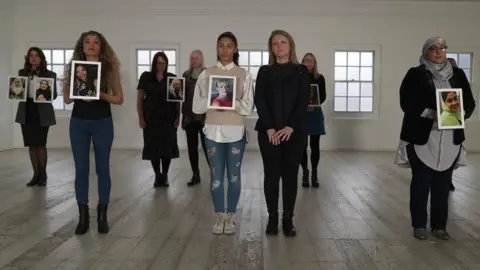 Graham Hodson
Graham HodsonFamilies whose mums, sisters and daughters were killed by men are calling for changes to the way police and authorities deal with violence against women. They want changes to how killers are sentenced and to the way the NHS and social services respond.
Three of those families have told BBC News how their loved ones were let down.
Missed 999 calls
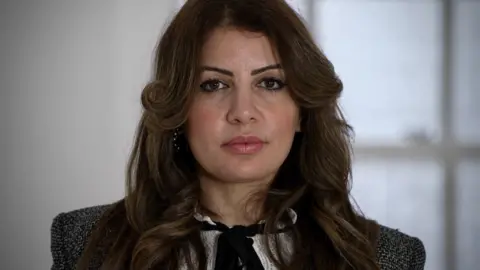 Graham Hodson
Graham HodsonKhaola Saleem and her daughter, Raneem Oudeh, were murdered, in 2018. They were killed by Raneem's ex-partner. Multiple failings by West Midlands Police contributed to their deaths, an inquest found this month. It heard how a number of 999 calls were dismissed by police.
Nour Norris, Khaola's sister, wants a change to the way domestic abuse victims are treated. "Preventing future deaths is very important. What we have seen in our case was devastating, the failure from the police and other sectors was outrageous, it was horrendous. There's a lack of understanding of domestic abuse.
"We're looking for more training on domestic abuse so police officers can deal with it as a very serious matter." Nour believes there is a lack of knowledge within the police about how to deal with domestic abuse - from call-handlers, to senior officers.
Nour says despite Raneem ringing 999, police officers "didn't come out, even though he was attacking her". She says. "I don't know what it takes for change to happen. Is it more women to die? More violence?"
Sixteen years in prison
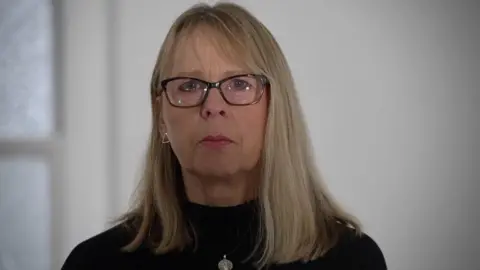 Graham Hodson
Graham HodsonJulie Devey's 24-year-old daughter, Poppy, was murdered in 2018 by her ex-boyfriend, who attacked her with a kitchen knife in their flat. She suffered 49 knife wounds. Poppy was due to move out, and her bags were packed.
Her killer was later jailed for 16 years, but Julie wants a fundamental change to sentencing of murderers. "If a weapon is taken to the scene of the crime, the starting minimum-term tariff is 25 years. If the weapon is deemed to be already at the scene of crime, then the starting tariff is 15 years. So there's a 10-year disparity," she says.
"By leaving it as it is, it's saying that the women who have their lives taken in the homes, their lives are worth ten years less. And that's gender-based sentencing. It's misogynistic and it's just unfair and unjust." The government has promised to look at the sentencing guidance, but Julie wants more. "We've all heard sympathetic voices and lots of nodding and 'oh we agree with you, that's awful, that's awful'," she says.
"[But] Politicians just don't imagine that it could happen to them. Well, it absolutely could. And if, for five minutes, they actually really tried to get inside the pain that we feel constantly, and think 'that could be my daughter lying there', then maybe they would begin to listen and really get these changes made."
Warnings ignored
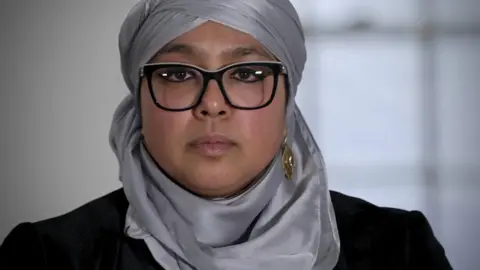 Graham Hodson
Graham HodsonOnjali Raúf says she has seen little change since the murder of her aunt, Mumtahina Jannat. Known as Ruma, she was 29 when she was strangled to death by her abusive husband, in 2011. During a custody hearing over the pair's children, a judge had earlier told Ruma how she was being a "silly woman" for fearing he might kill her.
"She spent five-and-a-half years trying to convince the police, the judicial system, the children's services, that he was a dangerous man - and nobody believed her. And it was only after her homicide review report came out that we realised the police, children's services, doctors, the school, everyone had nuggets of information. Nothing was shared," she says.
"When she went to court to try and identify to the judges and to the lawyers that this man was dangerous, she had no evidence. It was literally her word against his, even though everyone had a little piece of information."
Onjali believes there was also discrimination against her aunt. "The racism goes hand-in-hand with misogyny to downplay domestic violence even further than it was already downplayed," she says. She says she is joining other families who have lost loved ones "to say we're no longer willing to wait any more".
She adds: "We want you to listen to us, is really crucial."

According to the latest official crime statistics - between April 2020 and March 2021 - 177 women were murdered in England and Wales. Of those, 109 were killed by a man, 10 were killed by a woman, and in 58 cases there was no known suspect. The latest figures also show 1.7 million women experienced domestic abuse last year.
The bereaved families have formed a new campaign group, called Killed Women, to campaign for more to be done to protect women and ensure justice for victims.
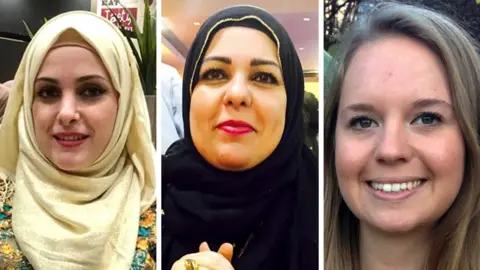
The group also includes the families of Ellie Gould, who was murdered in 2019 by her ex- boyfriend; Suzanne Van Hagen, who was killed in 2013; Banaz Mahmod, murdered in 2006 by her father and uncle; Jan Mustafa, murdered by a registered sex offender in 2019; and Gemma Marjoram murdered by her estranged husband in 2020.
Killed Women says it wants to raise awareness and promote policies to tackle fatal violence against women. The group is already backed by leading charities, as well as MPs from across the House of Commons.
"The voices of those bereaved by male violence deserve to be heard," Ruth Davison, chief executive of Refuge, the domestic abuse charity, said. "Their frustration and pain should galvanise policymakers to take the urgent action necessary to protect women."
A government spokesperson said tackling domestic homicide was a "key priority", adding: "In March, we published our tackling domestic abuse plan, which invests over £230m into tackling these heinous crimes." That includes £140m to support victims and £81m to tackle perpetrators.
The spokesman said the plan included a domestic abuse and domestic homicide prevention pilot and investment in healthcare settings to help identify and refer victims for support.